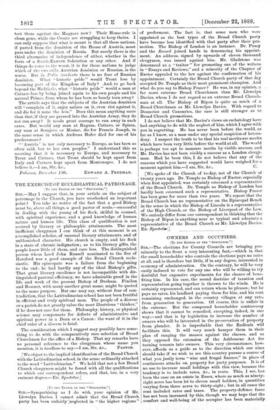[To THE EDITOR OF THE "SPECTATOR."]
SIR,—Sympathising as I do with your opinion of Mr. Llewelyn Davies, I cannot admit that the Broad Church party has been unfairly :neglected in "the higher regions" of preferment. The fact is, that some men who were appointed as the best types of the Broad Church party have become less identified with that party after their pro- motion. The Bishop of London is an instance. Dr. Pusey and the Record joined hands in denouncing his appoint- ment. An address, signed by upwards of eleven thousand clergymen, was issued against him. Mr. Gladstone was denounced as a " traitor " for promoting one of the writers in "Essays and Reviews," and a minority of the Chapter of Exeter appealed to the law against the confirmation of his appointment. Certainly the Broad Church party of that day accepted Dr. Temple as their most prominent champion. And what do you say to Bishop Fraser ? He was, in my opinion, a far more extreme Broad Churchman than Mr. Llewelyn Davies, whom I do not regard as an extreme Broad Church- man at all. The Bishop of Ripon is quite as much of a Broad Churchman as Mr. Llewelyn Davies. With regard to Deaneries and Canonries, the case is still stronger as to Broad Church promotions.
I do not believe that Mr. Davies's views on eschatology have had anything to do with the neglect of him, which I agree with you in regretting. He has never been before the world, as far as I know, as a man under any special suspicion of hetero- doxy. I suspect the truth to be that his real merits are merits which have been very little before the world at all. The world is perhaps too apt to measure merits by visible success, and Mr. Davies has not been visibly a success as a London clergy- man. Had he been this, I do not believe that any of the reasons which you have suggested would have weighed for a moment against him.—I am, Sir, &c., C.
[We spoke of the Church of to-day, not of the Church of twenty years ago. Dr. Temple as Bishop of Exeter, especially when first appointed, was certainly esteemed a representative of the Broad Church. Dr. Temple as Bishop of London has hardly been esteemed such a representative. Bishop Fraser has been gone for more than two years. We repeat that the Broad Church has no representative on the Episcopal Bench in the sense in which the Bishop of Lincoln is a representative of the High Church, or the Bishop of Liverpool of the Low. We entirely differ from our correspondent in thinking that the Bishop of Ripon is anything near so typical and adequate a representative of the Broad Church as Mr. Llewelyn Davies. ED. Spectator.]










































 Previous page
Previous page